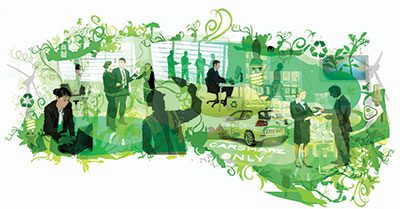
Some businesses sell coasters made from recycled soda cans. Some adopt policies that minimize paper use. Some choose to buy their energy from renewable sources, such as wind power. There are lots of ways a company can “go eco”—New Jersey businesses are incorporating environmentalism in as many ways as there are shades of green. “Green is not a luxury anymore,” PSEG president and CEO Ralph Izzo told the state’s business leaders at the company’s GreenFest this year. “Green is a business necessity.”
Many entrepreneurs are realizing that economic growth and environmental protection aren’t mutually exclusive—a more Earth-friendly mindset can actually attract customers. “New Jersey has to continue to be innovative,” says Jennifer Senick, founder and director of the Rutgers Center for Green Building. “This offers a competitive advantage.”
So what are New Jersey companies doing?
Prudential Financial in Newark took steps to reduce paper consumption, saving trees—and $2 million a year. “Everything we can possibly do to be green, we need to be doing,” says vice president of community resources Mary O’Malley. “It’s also a business opportunity.”
Through its Keeping It Green Foundation, Cipriano Landscape Design in Ramsey provides scholarships and internships to students who want to learn about eco-friendly architecture and horticulture. The company hosts workshops that encourage mature-tree conservation, renewable gardening, and water conservation.
It’s not just the diamonds that sparkle at Tiffany & Co.’s retail distribution centers in Whippany and Parsippany. The company installed 6,394 solar panels on its roofs, producing 1.3 megawatts of solar energy. That and other upgrades save the company a half-million dollars a year.
Eco Green, a house-cleaning service based in Linden, uses only organic and biodegradable products, leaving behind a lavender-filled sachet for a natural fragrance—and no harsh chemicals to harm people, pets, or the planet.
At Neshanic Station-based Revival Construction, natural cotton-fiber insulation, nontoxic paint, and composting toilets are par for the course. “People can get behind the idea that living efficiently and healthier is better for everyone,” says owner Mike Hathaway. “It constantly pushes us to do more or be better by developing local supply chains, encouraging recycling and the always-popular [making] my business stand out.”
Tips:
Energy Use
• Install solar panels on the roof (and take advantage of New Jersey’s tax rebates).
• Set up a motion-sensor lighting system so lights automatically go out when no one is in the room.
Water
• Cut back on sprinkling; plant drought-tolerant vegetation.
Recycle and Reuse
• Place a recycling bin at every desk or workspace.
• Donate old equipment to a charity.
• Refill ink in printers rather than replace cartridges. If replacing, recycle old cartridges.
Transportation
• Encourage carpooling and give parking priority to high-occupancy vehicles.
• Set up a shuttle to the nearest mass transit hub.
• Consider hybrid or other fuel-efficient vehicles for the company fleet.
